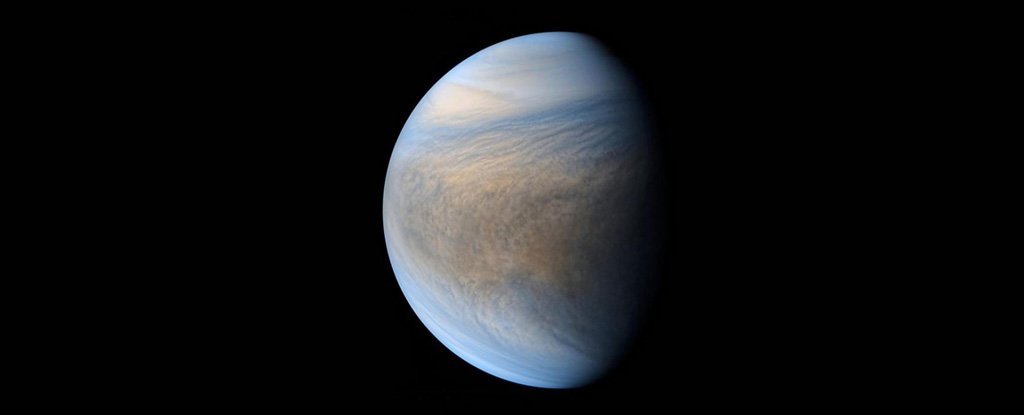ΣΧΟΛΙΟ ΙΣΤΟΛΟΓΙΟΥ : Η Αφροδίτη ακόμα δεν μπορεί να είναι βιώσιμη και κατοικήσιμη για το ανθρώπινο είδος. Κάποια στιγμή όμως στο μέλλον θα γίνει η νέα ΓΗ ή ΓΑΙΑ για την ανθρωπότητα. Διότι όπως πάντα την εδώ ΓΑΙ-Α θα την κάνουν ακατοίκητη όπως και τον Άρη και την Σελήνη και ένα σωρό άλλους πλανήτες από όπου πέρασε το "σαράκι" του Ηλιακού μας Συστήματος. Ήδη άρχισε να γίνεται γαλάζια....όπως η Γη.
In fact, our neighbouring planet could have turned out to be quite temperate and habitable. The new study proposes that the gravitational pull of Jupiter pushed Venus closer to the Sun, creating a runaway greenhouse effect and vaporising surface oceans.
Scientists used a computer model to track the position of planets across the Solar System, revealing that as Jupiter moved away from the Sun about a billion years ago, it would have nudged Venus into the almost perfect circular orbit that it has today.
"As Jupiter migrated, Venus would have gone through dramatic changes in climate, heating up then cooling off and increasingly losing its water into the atmosphere," says astrobiologist Stephen Kane from the University of California, Riverside.
The very uniform and circular orbit that Venus has around the Sun is unusual: most planets have an orbit that's much more elliptical, with distances to the Sun varying through the year. Back when the orbit of Venus was elliptical, the team thinks it would have been much more hospitable.
With a mass two-and-a-half times that of all the other planets in the Solar System combined, the formation of Jupiter and its subsequent journey around the Sun are likely to have had a profound impact on the rest of our own segment of space.
If there once was life on Venus, it was probably killed off a long time ago, the scientists say. While the recent discovery of phosphine gas on Venus could hint at microbial life, those microbes would've had to have been clinging on in the harshest of conditions for the past billion years.
"There are probably a lot of other processes that could produce the gas that haven't yet been explored," says Kane.
As the researchers point out, this all involves some incredibly complicated maths and plenty of assumptions. There remain a lot of outstanding questions about Venus, but this new study demonstrates that Jupiter's movement certainly had the potential to seriously impact the orbit of Venus in the early days of the Solar System, and that might in turn have had drastic consequences for the planet's climate.
This is far from the first time scientists have suggested that Venus was once perfectly hospitable to life, though for now we're relying on computer models and some smart guesswork rather than anything we've found on the planet itself. Several missions are in the works that could change that, however.
What makes studying the history of Venus so important is that the planet is very similar to Earth in a lot of ways, including its size, composition and density. If we can work out what happened to it, we should have a better chance of stopping Earth going the same way.
"I focus on the differences between Venus and Earth, and what went wrong for Venus, so we can gain insight into how the Earth is habitable, and what we can do to shepherd this planet as best we can," says Kane.

2 σχόλια:
Ακριβώς. Ήμουν κι εγώ εκεί, - και αν δεν με απατά η εγκλωβισμένη αθάνατη μνήμη μου - κάποιον χρυσούν αιώνα όταν οι ανθρωποθεοί περιφέροντο διαστημικώς σ' όλο το πλανητικό σύστημα, από πλανήτη σε πλανήτη και δορυφόρο σε δορυφόρο, όπως οι νυν Αθηναίοι ταξιτζήδες Μαρούσι-Κηφισιά-Νέα Σμύρνη.
Μετά κάτι έγινε, - ξεμείναμε από νέκταρ; - και το υπαίθριο σινεμά έκλεισε. Υπάρχουν κάτι εμπειρίες απροβλέπτου θεϊκού κάλλους, εμπειρίες αξέχαστες και αναλλοίωτες στον ρευστό χωροχρόνο μας, που δεν σε αφήνουν ποτέ να πλήξεις από αθανασία!
Ένας νέος μηρός?
Με έναν αντίστοιχο προστατευτικό θόλο ?
Δημοσίευση σχολίου